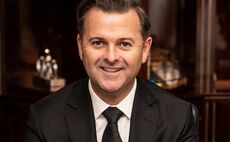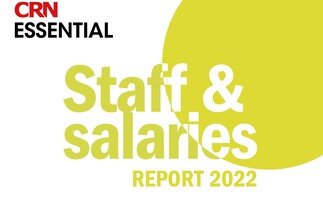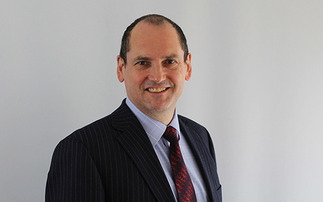Daisy's CEO tells us why the Lancashire-based firm, which ranked #3 in Top VARs 2017, is turning its attention to organic growth following an acquisition spree that has transformed it into a £700m-revenue player
Can you update us on the enlarged scale of the business following your acquisition spree?
We are now a £700m business, with £120m-plus of EBITDA. From a market point of view, SMB - which we address both directly and indirectly - is a £300m business; mid-market - which we address directly - is a £300m business; and enterprise - which we address indirectly - is a £100m business.
If we break it down by product, we are a £130m voice business, a £150m mobile business, a £170m connectivity business, a £170m IT infrastructure business and a £80m to £100m business continuity and cloud business. We couldn't, through the acquisitions, have chosen a better balance of a £700m business across the five areas of the converged world. We talk about Daisy being the only one that exists which is an independent, converged
organisation of scale.
You acquired Alternative Networks for £165m at the start of the year. Has the integration gone to plan, and do you foresee Daisy making further acquisitions?
The integration has gone extremely well. Combining the telecommunications and managed services that came with the Alternative acquisition with the IT infrastructure services and support of the Phoenix acquisition has created a midmarket
powerhouse. We can now deliver converged services across telecoms, IT and cloud, genuinely at scale.
We believe we now have all the capability we need in order to address our customers' requirements. We are therefore in an organic growth strategy. Having said that, if any opportunities were
to arise to increase shareholder and customer value, naturally we
would look at them. But given the strength of our business there is a very, very high return on investment bar to meet.
What key trend will shape the market in 2018?
We believe data is the key hot topic, which I think traditional IT resellers don't necessarily buy into at the same rate as we do because they probably don't have the end-to-end capability to enable it. Whoever owns the connectivity, whoever owns the network, is probably going to take market share because data is the new currency and everything that will give our customers a competitive advantage. Our whole strategy is based on how we can provide our customers with better levels of access to that data.
Profits are down across the top 250 resellers. How are you addressing margin pressure, particularly considering that margins are thinner in IT than your traditional comms heartland?
We don't mind our percentage margins being diluted by [IT] acquisitions, as this is about us delivering customer value. We recognise that you can't make the same percentage returns on IT as in telecommunications. But actually because we can blend it all together we are making more money. It doesn't really matter if the percentage return has decreased by 0.5 per cent; the fact of the matter is that EBITDA has gone from £97m to £120m. We are
maintaining our gross margins because 80 per cent of our revenues are recurring.
What is in store for Daisy next year?
We're in an organic strategy, we've got our heads down, and we are focused on serving and protecting our customers, and on cross-selling to all our existing customers. For instance, 50 per cent of our 5,000 mid-market customers don't buy mobile from us, and
that's a massive opportunity for us to add more value to them. We're the fourth-largest B2B mobile operator in the UK now behind EE, Vodafone and O2, and we can use our scale and independence to deliver greater value to our customers.
Daisy's CEO tells us why the Lancashirebased
firm is turning its attention to
organic growth following an acquisition
spree that has transformed it into a
£700m-revenue player
Can you update us on the enlarged scale of the
business following your acquisition spree?
We are now a £700m business, with £120m-plus of
EBITDA. From a market point of view, SMB - which
we address both directly and indirectly - is a £300m
business; mid-market - which we address directly
- is a £300m business; and enterprise - which we
address indirectly - is a £100m business.
If we break it down by product, we are a £130m
voice business, a £150m mobile business, a £170m
connectivity business, a £170m IT infrastructure
business and a £80m to £100m business continuity
and cloud business. We couldn't, through the
acquisitions, have chosen a better balance of
a £700m business across the five areas of the
converged world. We talk about Daisy being the only
one that exists which is an independent, converged
organisation of scale.
You acquired Alternative Networks for £165m at
the start of the year. Has the integration gone to
plan, and do you foresee Daisy making further
acquisitions?
The integration has gone extremely well. Combining
the telecommunications and managed services that
came with the Alternative acquisition with the IT
infrastructure services and support of the
Phoenix acquisition has created a midmarket
powerhouse. We can now deliver
converged services across telecoms, IT
and cloud, genuinely at scale.
We believe we now have all the
capability we need in order to address our
customers' requirements. We are therefore
in an organic growth strategy. Having
said that, if any opportunities were
to arise to increase shareholder
and customer value, naturally we
would look at them. But given
the strength of our business there is a very, very high
return on investment bar to meet.
What key trend will shape the market in 2018?
We believe data is the key hot topic, which I think
traditional IT resellers don't necessarily buy into at
the same rate as we do because they probably don't
have the end-to-end capability to enable it. Whoever
owns the connectivity, whoever owns the network,
is probably going to take market share because
data is the new currency and everything that will
give our customers a competitive advantage. Our
whole strategy is based on how we can provide our
customers with better levels of access to that data.
Profits are down across the top 250 resellers. How
are you addressing margin pressure, particularly
considering that margins are thinner in IT than
your traditional comms heartland?
We don't mind our percentage margins being
diluted by [IT] acquisitions, as this is about us
delivering customer value. We recognise that you
can't make the same percentage returns on IT as in
telecommunications. But actually because we can
blend it all together we are making more money. It
doesn't really matter if the percentage return has
decreased by 0.5 per cent; the fact of the matter is
that EBITDA has gone from £97m to £120m. We are
maintaining our gross margins because 80 per cent
of our revenues are recurring.
What is in store for Daisy next year?
We're in an organic strategy, we've got our heads
down, and we are focused on serving and
protecting our customers, and on cross-selling
to all our existing customers. For instance,
50 per cent of our 5,000 mid-market
customers don't buy mobile from us, and
that's a massive opportunity for us to add
more value to them. We're the fourth-largest
B2B mobile operator in the UK
now behind EE, Vodafone
and O2, and we can use our
scale and independence to
deliver greater value to our
customers.













